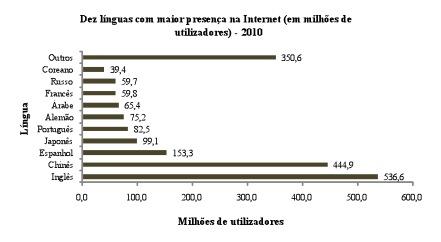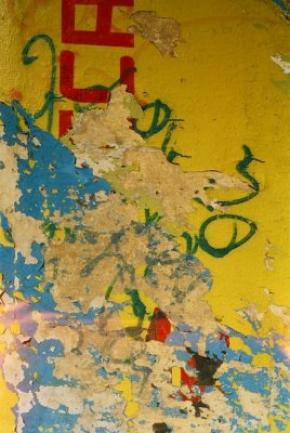Lusosphere, identity and diversity in the network society
Lusosphere, as imagined community, sets an idea that can be approached by different points of view. It is a project with a five-century past, based on the common denominator of the Portuguese language, and this is why it is, at the same time, a project spread through different spaces on every continent of the earth, where citizens of different ethnic and cultural identity live. So it is our concern to reflect on and to understand the complex construction of lusosphere in contemporary times, as to be able to project it in the future.
 António Ole’s work
António Ole’s work
First of all, we shall consider that the recent past was marked by the History of a post-colonial lusophone space, shattered and set again as a group of independent and geographically distant nations. This is maybe the reason why the relationship among Portuguese-speaking countries is, even nowadays, submitted to contradictions and dilemmas that continue to postpone the desired approximation, the only thing that could form and strengthen the collective consciousness of a lusophone community.
At the same time, lusosphere has been traditionally intended on the basis of progressively reducing dimensions: the geographic one, that unite the eight countries of the Community of Portuguese Speaking Countries (Portuguese: Comunidade dos Países de Língua Portuguesa, CPLP); the political one, that is confined to Portuguese speaking communities spread all over the world; and finally, the historical and cultural one, related to the Portuguese inheritance in different parts of the earth during the maritime expansion and the colonial empire. How can’t we see in any one of these dimensions, quoting Moisés de Lemos Martins1, “a space of imaginary refuge” and of “imperial nostalgia”?
It is in this way that lusosphere risks to fall in a conceptual misunderstanding that we must avoid, that is a convenient way of denominating the countries resulting of Portuguese colonization.
Secondly, the language politics implemented in lusophone countries – that present the proposal of a new orthographic agreement, with the good-intentioned purpose of preserving the principal identity factor of this imagined community – have been received and integrated in different ways and represent today one of the most heated discussions in lusosphere. More, there are those who consider this agreement as a threat to oral and written Portuguese varieties used in each lusophone country, since these are symbolically associated to the assertion of diversity and to the preservation of local identities.
However, the globalization and the new communication model based on the converging and the wide use of information technologies – the network society – have assembled a new place for lusosphere, where virtual nets among citizens who think, feel and speak in Portuguese are established. This is the cyberspace.
As Frank Webster2 reminds us, everyone of us has assisted, in the latest years, to the accentuated reduction of prices of electronic and digital material and at the same time we have been surrendering to its undoubted skills of processing, storage and transmission of information. In a parallel way, the converging of digital and telecommunications networks has enabled the development of the management of information and its extended distribution, as well as the possibility of establishing a connection, in real time, between distant physical spaces.
If we relate this new communicational reality with the powerful identity factor that a common language can be, we will be able to reflect on the contribution of cyberspace to the approximation of citizens speaking the same language. And if we think about a language spoken by many millions of citizens scattered through the world and belonging to many different races and cultures, this thought is even more punctual. This is the case of Portuguese language.
In few years thousands of sites, blogs and forums in Portuguese have inundated the Internet, and in this way Camões’s language has become one of the more influent in the World Wide Web. According to Internet World Stats, in June 2010, this tool was used by 1,966,514,816 people around the world. Lusophone users were approximately 82,548,200, representing the fifth linguistic community with the highest representativeness in the cyberspace, as it can be verified in the graph below. Thus, we are able to propose a virtual dimension of lusosphere.
 Ten languages with the highest presence in the Internet (in millions of users) Others – Korean – Russian – French – Arab – German – Portuguese – Japanese – Spanish – Chinese – English
Ten languages with the highest presence in the Internet (in millions of users) Others – Korean – Russian – French – Arab – German – Portuguese – Japanese – Spanish – Chinese – English
In the opinion of Pierre Lévy4, the propagation of cyberspace to the planetary scale has created a propitious path to develop a collective intelligence, able to encompass the difference, and a territory that sets the public space necessary to the intervention of a civil society with global consciousness.
 António Ole’s workIf we admit this optimist vision about the potential hold in the network society, can we project a virtual dimension of lusosphere that encompasses and preserves the difference of cultural practices present in the places where Portuguese is spoken, granting tolerance and respect for differences? What kind of contribution will the cyberspace offer to the consolidation of the collective consciousness of a lusophone community?
António Ole’s workIf we admit this optimist vision about the potential hold in the network society, can we project a virtual dimension of lusosphere that encompasses and preserves the difference of cultural practices present in the places where Portuguese is spoken, granting tolerance and respect for differences? What kind of contribution will the cyberspace offer to the consolidation of the collective consciousness of a lusophone community?
In the Internet era, we shall not lose sight of the tension between lusophone identity and diversity even because, according to Helena Sousa5 thought, lusosphere is “an extraordinary difficult construction”. On the other hand, the traditional rhetoric about lusosphere has often insisted in a sort of nostalgia of the empire, underestimating the cultural diversity that five centuries of adventures associated to the experience of every citizen that thinks, feels and speaks in Portuguese.
That is why it will be important – and maybe urgent, too – that a group of politicians, intellectuals and academics, who have brought to light many tracks about the complex construction of lusophone identity, reflect on the contribution that cyberspace offers to the reconfiguration of a more inclusive and more plural lusosphere.
article published in PESSOA
- 1. Professor of Communication Sciences at Universidade do Minho (Portugal).
- 2. Head of the Sociology Department at the City University, London (England).
- 3. Source: Internet World Stats (http://www.internetworldstats.com/stats7.htm).
- 4. Full Professor of Sociology of Communication at Ottawa University (Canada).
- 5. Professor of Communication Sciences at Universidade do Minho (Portugal).